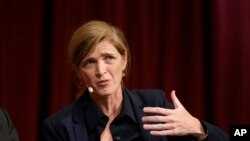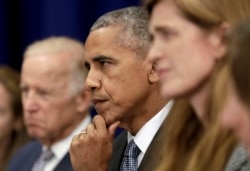Samantha Power, nominated by President-elect Joe Biden to head the U.S. Agency for International Development, brings human rights and development experience to the role if confirmed.
“As a journalist, activist, and diplomat, I’ve seen the world-changing impact of @USAID,” Power offered in a tweet. “At this critical moment, I feel immensely fortunate to have the chance to serve again, working with the incredible USAID team to confront COVID-19, climate change, humanitarian crises, & more.”
Power would be responsible for the federal development agency that manages $27 billion in federal funding, 12 programs and more than 13,000 employees. USAID is one of the largest international development agencies in the world that aims to reduce poverty and strengthen democratic governance, according to its website. The organization’s goal is to promote a path to self-reliance in other nations, it states.
Power started her professional career as a journalist after earning a bachelor’s degree from Yale University in Connecticut in 1992, eventually writing for Time, The Atlantic and The New Yorker magazines. She began as a freelance reporter and covered the war in Bosnia for The New Republic. Power went on to report on conflict in other places such as East Timor and Sudan.
Having seen poverty, lack of education and lack of leadership on the ground level, she said in Vogue, she moved into human rights work. The Rwandan genocide of 1994 inspired her to write her first book.
She is the founding executive director of the Carr Center for Human Rights Policy at Harvard University’s Kennedy School of Government. In addition, she is the Anna Lindh Professor of the Practice of Global Leadership and Public Policy at the Kennedy School, and the William D. Zabel ’61 Professor of Practice in Human Rights at Harvard Law School — her alma mater.
Power served as the ambassador to the United Nations under President Barack Obama from 2013-2017,replacing Susan Rice. She is the youngest U.S. ambassador to the U.N.
In her time as the U.S. ambassador, Power strongly opposed Russian aggression in Ukraine and Syria — though she faced criticism because of a lack of military intervention in Syria, particularly after the Obama White House assessed that the Syrian government used chemical weapons against its own people on Aug. 21, 2013.
Ups, downs with Obama
Her relationship with Obama began before his presidency when he tapped her as a foreign policy adviser during his time as a senator from Illinois.
Her work with the 44th president was not without scrapes. Power was fired in 2008 after calling former Secretary of State Hillary Clinton a “monster” during the presidential primary season while on a phone call in an interview with The Scotsman. She told the Guardian in 2019: “Suddenly to fall flat professionally in such a highly public way and to have no job ... I was just like a wandering person.”
Power’s unemployment did not last too long, as Obama chose her to be a part of his cabinet upon securing the presidency. Power served on the National Security Council as special assistant to the president and senior director for multilateral affairs and human rights before her tenure with the U.N.
Power is the author of three books, including “A Problem from Hell: America and the Age of Genocide,” which earned her the Pulitzer Prize in General Nonfiction in 2003. The book detailed the lack of U.S. involvement in instances of genocide. Her most recent book, titled “The Education of an Idealist,” is a 2019 memoir that details her life from a childhood in Dublin to diplomacy in the Obama administration.
Family life
As written in her memoir, Power was born on Sept. 21, 1970, in London to Jim Power and Vera Delaney, though she spent most of her youth in Ireland. She immigrated to the U.S. and moved to Pennsylvania at nine-years-old with her mother and younger brother, Stephen, in September of 1979. Her father, who later died of alcoholism, remained in Ireland after her parent’s divorce.
In 1983, Power moved to Georgia with her family. She attended Lakeside High School in Atlanta, Georgia, where she witnessed the desegregation of her school system. Though Brown v. Board of Education (1954) ruled racial segregation in public schools unconstitutional, it was still in practice by the time Power got to high school.
The date of Power’s confirmation hearing has not yet been determined.






